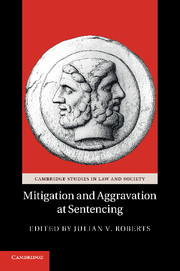Book contents
- Frontmatter
- Contents
- Tables
- Contributors
- Foreword
- Acknowledgments
- Chapter one Punishing, more or less
- Chapter two Re-Evaluating the Justifications for Aggravation and Mitigation at Sentencing
- Chapter three The Search for Principles of Mitigation
- Chapter Four Personal Mitigation and Assumptions about Offending and Desistance
- Chapter Five Intoxication as a sentencing factor
- Chapter Six Beyond the Partial Excuse
- Chapter Seven Equality before the law
- Chapter Eight Personal mitigation
- Chapter Nine Exploring Public Attitudes to Sentencing Factors in England and Wales
- Chapter Ten The Pernicious Impact of Perceived Public Opinion on Sentencing
- Chapter Eleven Addressing Problematic Sentencing Factors in the Development of Guidelines
- Chapter Twelve Proof of Aggravating and Mitigating Facts at Sentencing
- Chapter Thirteen Mitigation in Federal Sentencing in the United States
- Chapter Fourteen The discretionary effect of mitigating and aggravating factors
- Index
- References
Chapter Nine - Exploring Public Attitudes to Sentencing Factors in England and Wales
Published online by Cambridge University Press: 07 September 2011
- Frontmatter
- Contents
- Tables
- Contributors
- Foreword
- Acknowledgments
- Chapter one Punishing, more or less
- Chapter two Re-Evaluating the Justifications for Aggravation and Mitigation at Sentencing
- Chapter three The Search for Principles of Mitigation
- Chapter Four Personal Mitigation and Assumptions about Offending and Desistance
- Chapter Five Intoxication as a sentencing factor
- Chapter Six Beyond the Partial Excuse
- Chapter Seven Equality before the law
- Chapter Eight Personal mitigation
- Chapter Nine Exploring Public Attitudes to Sentencing Factors in England and Wales
- Chapter Ten The Pernicious Impact of Perceived Public Opinion on Sentencing
- Chapter Eleven Addressing Problematic Sentencing Factors in the Development of Guidelines
- Chapter Twelve Proof of Aggravating and Mitigating Facts at Sentencing
- Chapter Thirteen Mitigation in Federal Sentencing in the United States
- Chapter Fourteen The discretionary effect of mitigating and aggravating factors
- Index
- References
Summary
Our volume now moves away from the theory and practice of mitigation and aggravation at sentencing to consider the views of the community. The next chapter, by Austin Lovegrove, reports findings from a project involving members of the public and judges in Australia. In this chapter we draw on a number of large-scale quantitative surveys to explore public attitudes to the factors that aggravate or mitigate sentence. The purpose of this essay is to describe recent research findings which illuminate public attitudes to a number of common sentencing factors. These results challenge the view that the public are inflexible, punitive sentencers with little interest in mitigation, and shed light on the model of sentencing to which many people subscribe.
CHAPTER OVERVIEW
The chapter begins by discussing some recent survey trends with respect to public attitudes to sentencing. We then discuss some reasons why we might want to know about attitudes to mitigation and aggravation. Some methodological caveats are issued; different approaches to measuring public attitudes will yield very different responses. This discussion is followed by a presentation of some specific research findings from a study involving a large, representative sample of the public in England and Wales. Finally, we draw some conclusions for the sentencing process.
- Type
- Chapter
- Information
- Mitigation and Aggravation at Sentencing , pp. 168 - 187Publisher: Cambridge University PressPrint publication year: 2011
References
- 3
- Cited by



